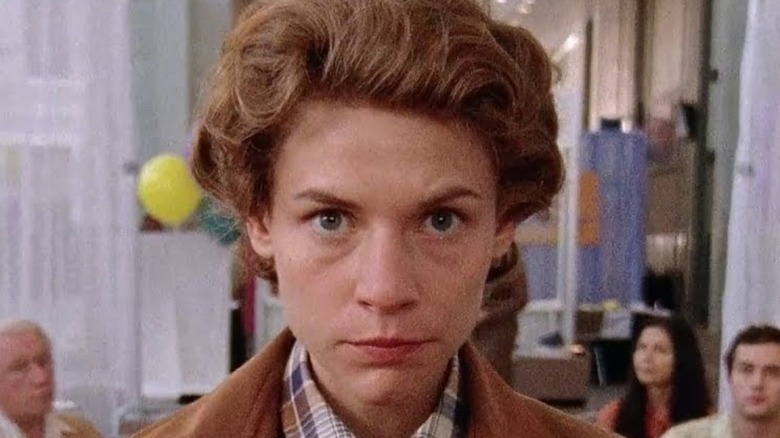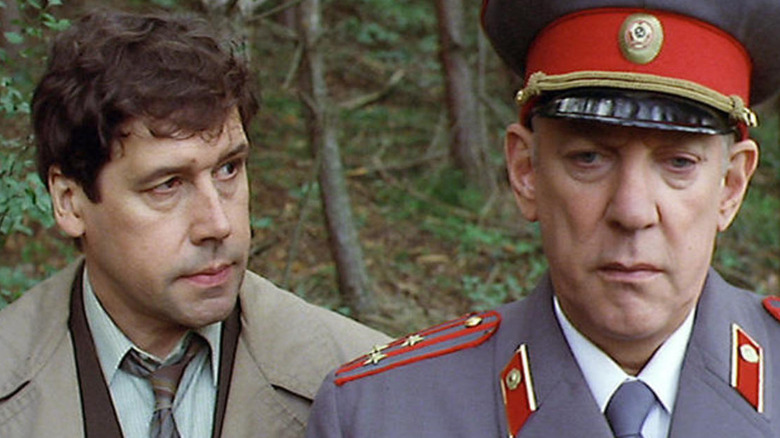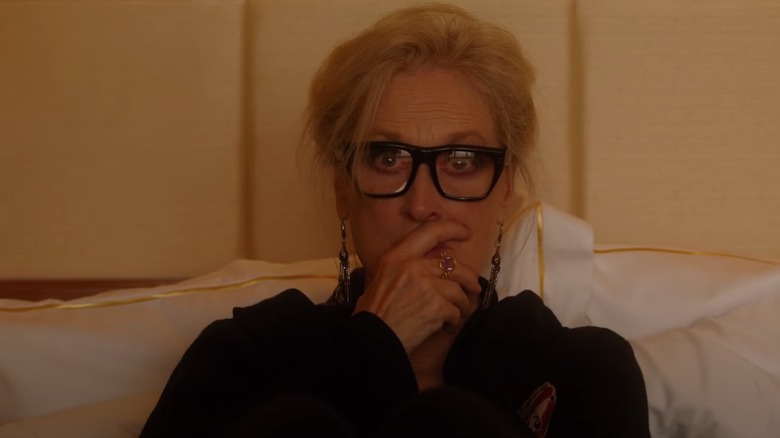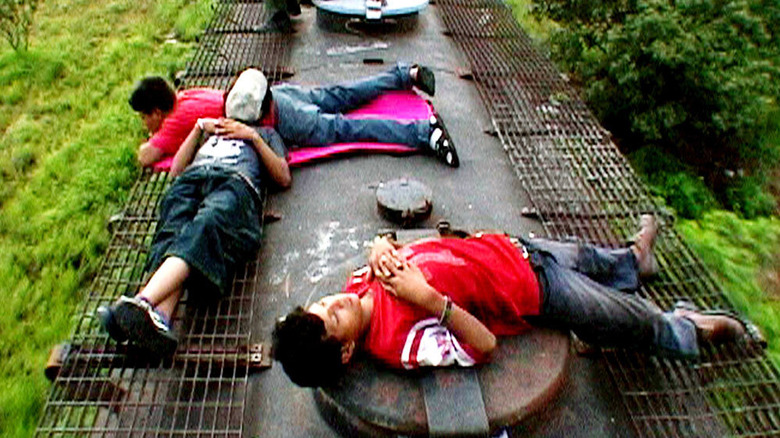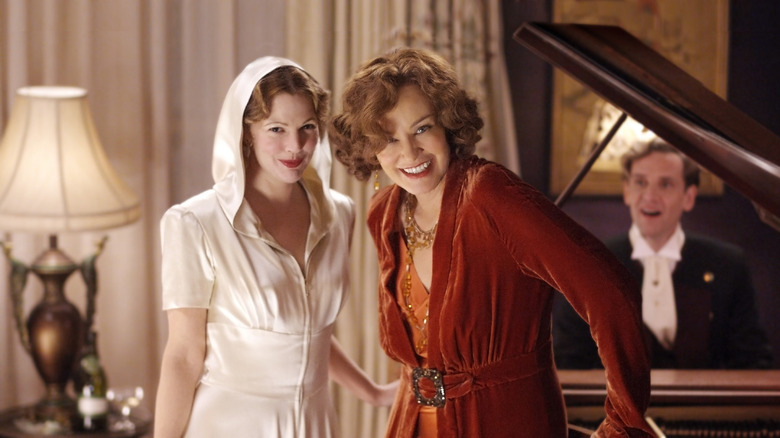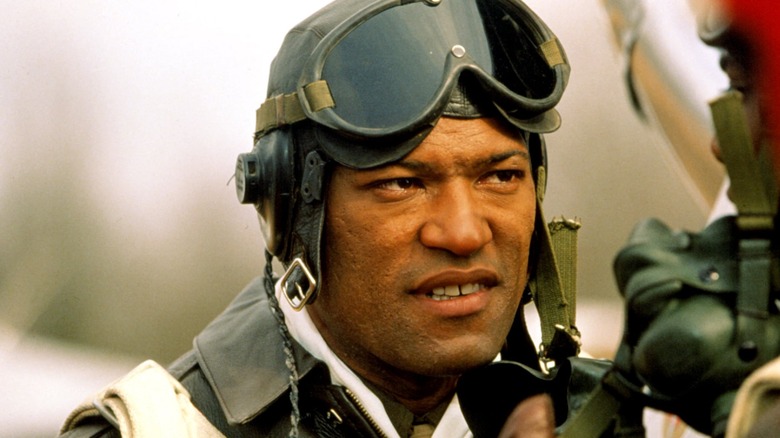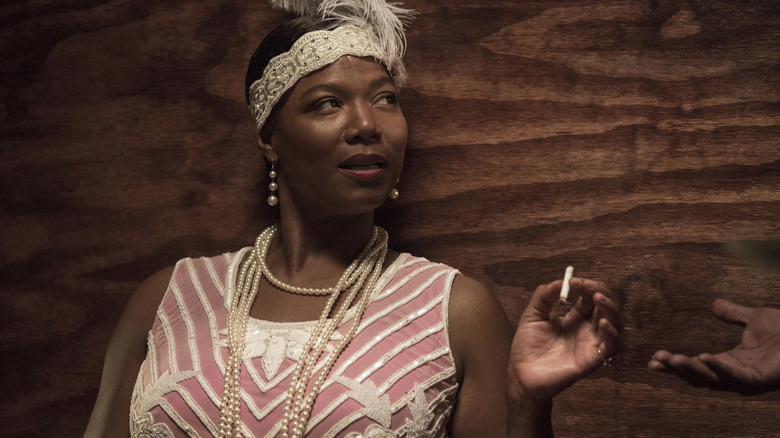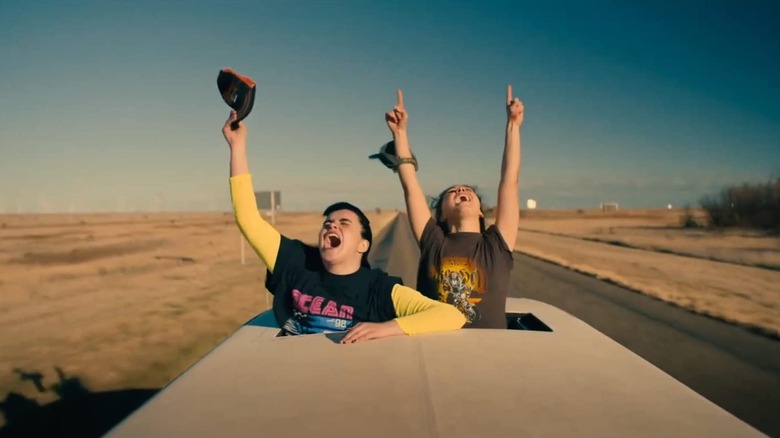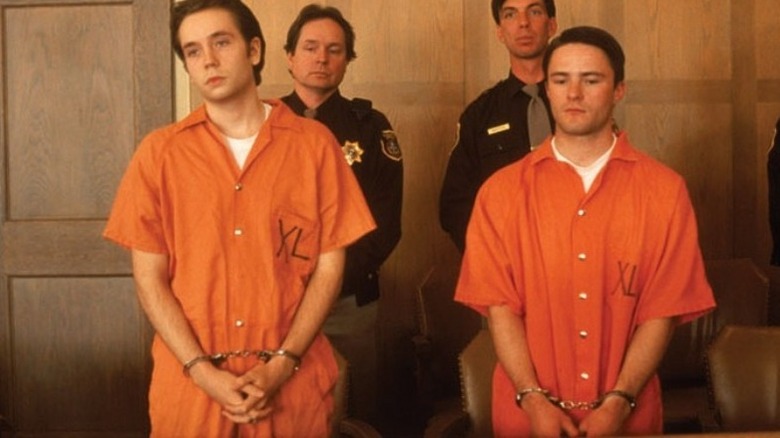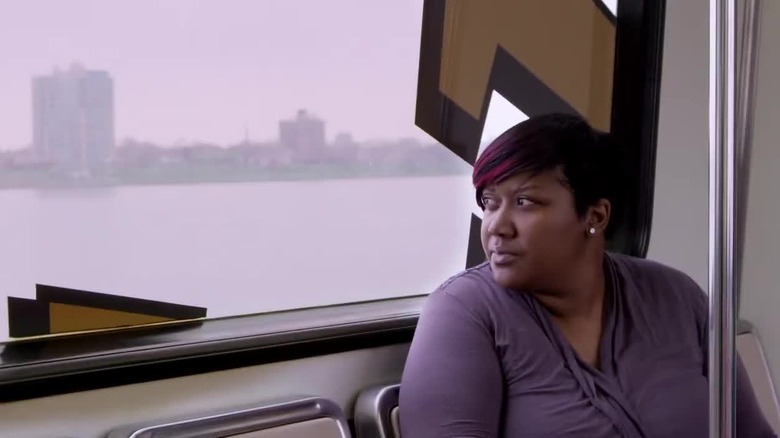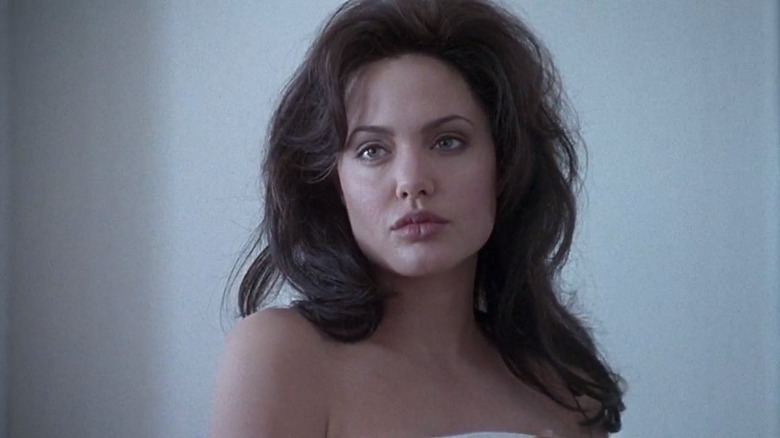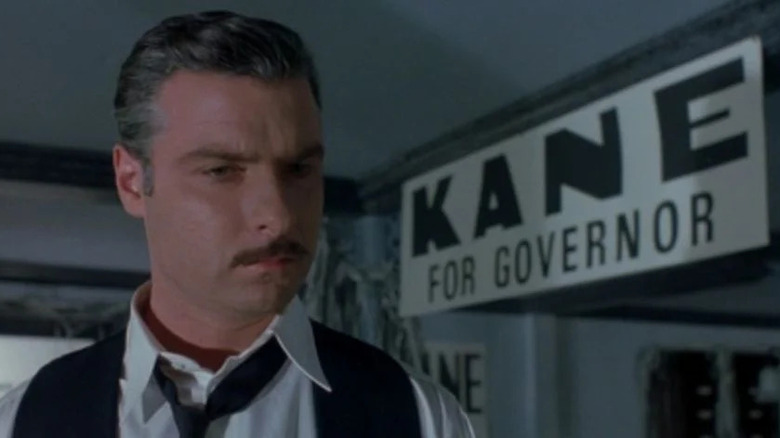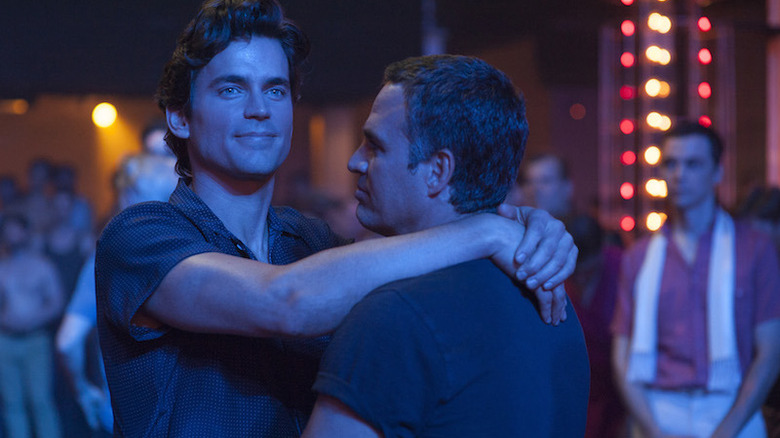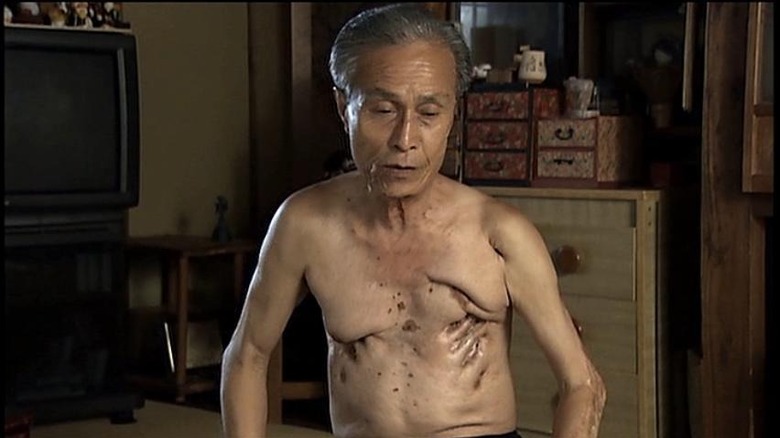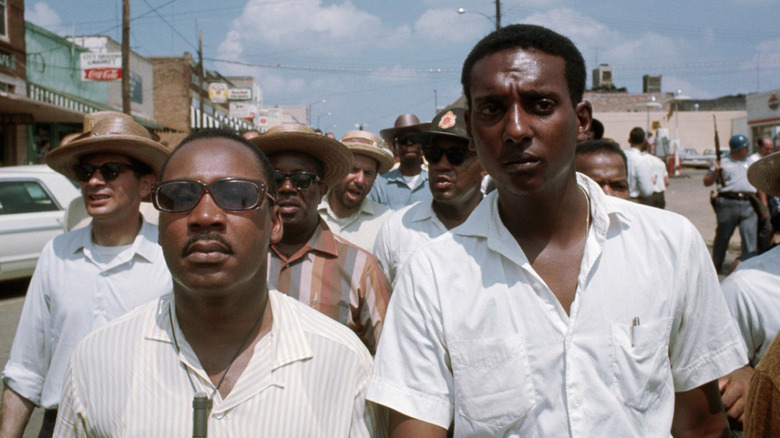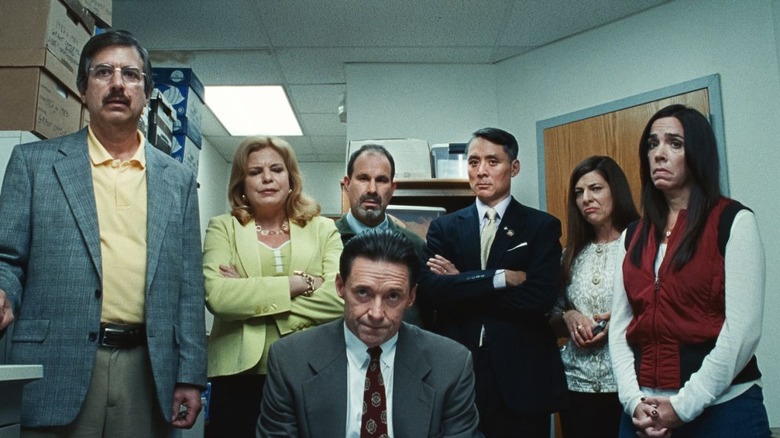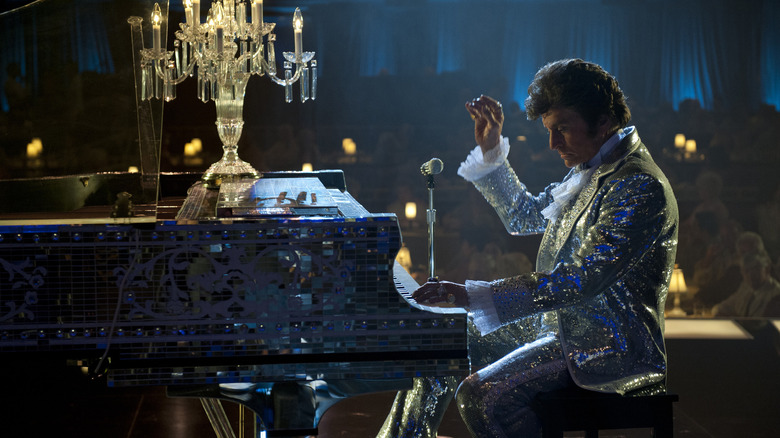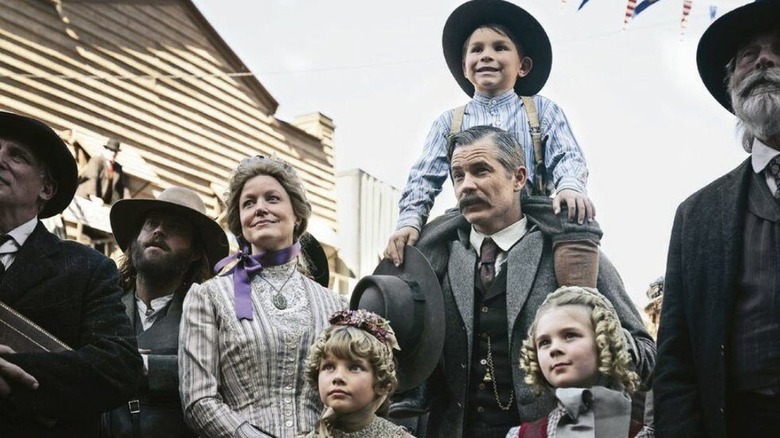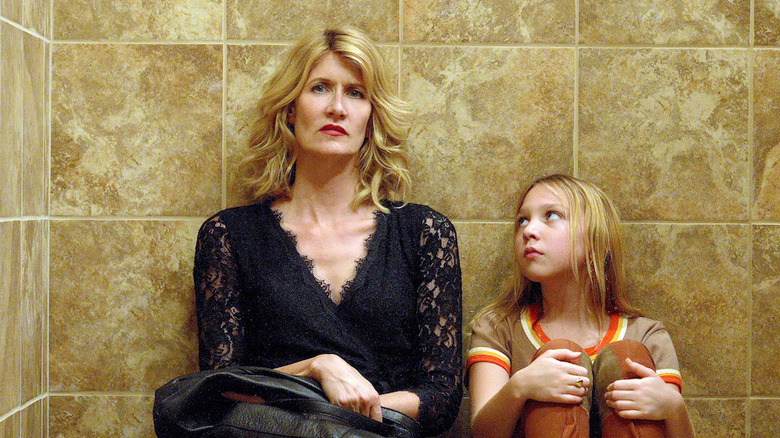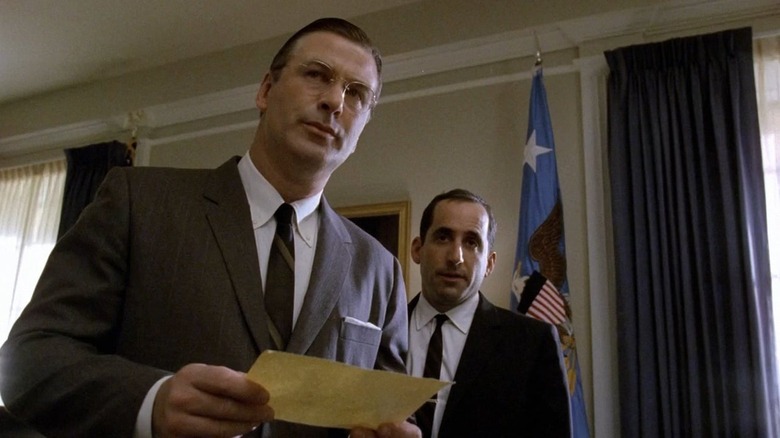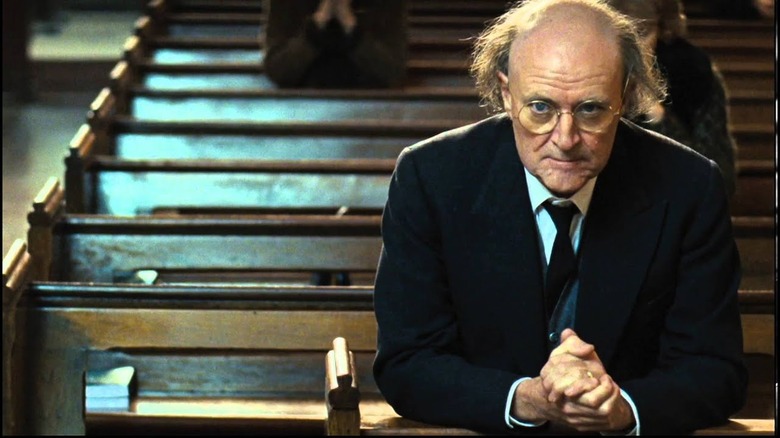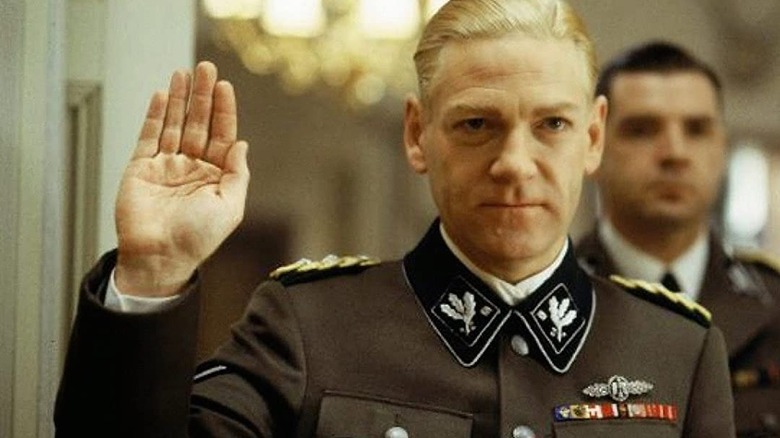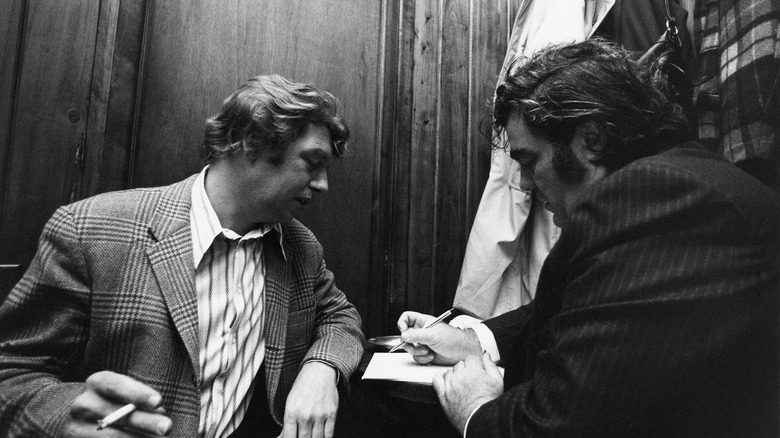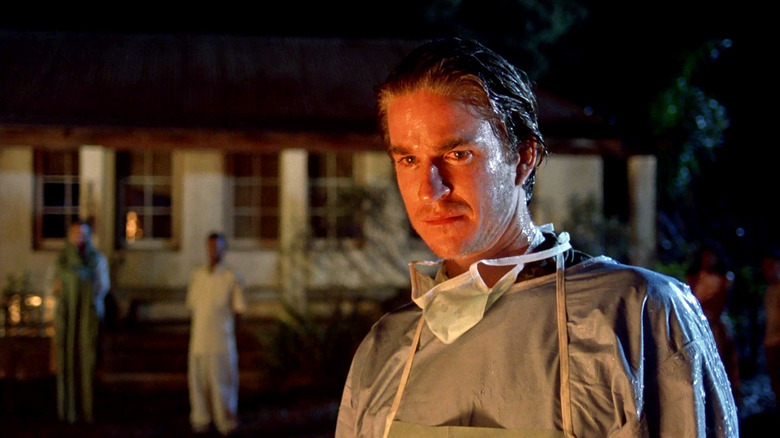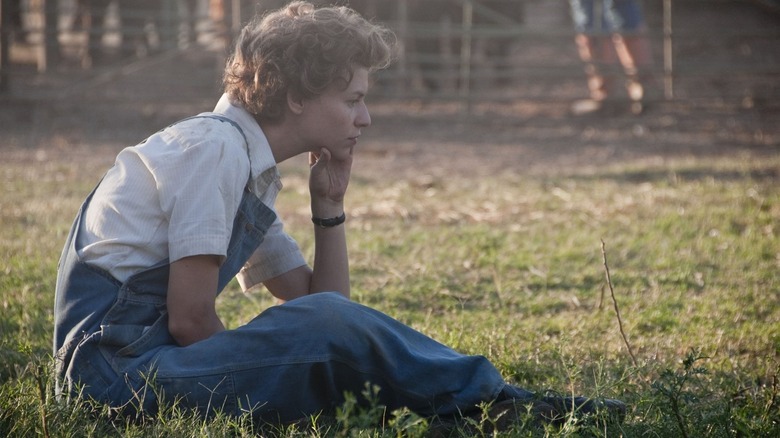25 Best HBO Original Movies You Can't Watch Anywhere Else
There was a time when HBO was little more than a premium subscription network. Back then, its main selling point was that, before streaming services, DVDs, or even widespread VCRs were the norm, they broadcast popular feature films without the content restrictions of major networks. It didn't take long before HBO saw the potential in original content, however. In 1982, HBO aired "The Deadly Game," a made-for-TV thriller the network co-produced. The following year brought the biopic "The Terry Fox Story." Finally, in 1984, HBO released its first in-house theatrical film, the action-thriller "Flashpoint."
While "Flashpoint" didn't exactly impress critics, HBO's original films improved over the years. In particular, the network slowly became known for making successful films out of stories other studios considered too controversial, dry, or cerebral to tackle. The advent of HBO Max has only expanded the list of great HBO films, with no sign of a slow-down in sight. In celebration of this storied past and bright future, we present the 25 best HBO original films, from portrayals of political power to raucous road comedies.
Citizen X (1995)
Based on the real life story of Andrei Chikatilo, a Soviet serial killer who murdered over 50 women and children between 1978 and 1990, "Citizen X" is a slow-burning crime thriller. Chikatilo is stalked for years by Detective Viktor Burakov (Stephen Rea), who is hampered at every turn by a local committee of communist party leaders who ignore his findings. Donald Sutherland stars as Colonel Mikhail Fetisov, a bureaucracy-savvy cynic who sympathizes with Burakov's plight but will go only so far to help him. The late Max von Sydow plays Dr. Alexandr Bukhanovsky, a psychiatrist who risks everything to give Burakov his insights in a climate where even showing interest in abnormal psychology could lead to professional ruin.
Not only is "Citizen X" an engrossing and thoughtful thriller, its focus on an infuriating bureaucracy that favors optics over the lives of children makes it evergreen. It many ways, it serves as a companion piece to the celebrated 2019 HBO series "Chernobyl."
Let Them All Talk (2020)
Pulitzer Prize-winning author Alice Hughes (Meryl Streep) isn't in the best of health, so when it's time for her to cross the pond in order to accept a literary prize, she skips the airport in favor of a cabin aboard the Queen Mary 2. But she doesn't go alone: Her nephew Tyler (Lucas Hedges) comes along, as do old friends Susan (Dianne Wiest) and Roberta (Candice Bergen). The latter woman is chomping at the bit to confront Alice for, Roberta believes, using her life as fodder for her writing. Alice's agent Karen (Gemma Chan) secretly comes aboard as well — she wants to figure out exactly what Alice is working on, in the hopes that it's a sequel to her bestselling book, "You Always/You Never."
"Let Them All Talk" is one of director Steven Soderbergh's best films. Impressively, most of the movie's dialogue was improvised by the actors. This gives the film a natural, light feel, well-supported by the talents of acting legends Streep, Wiest, and Bergen.
Which Way Home (2009)
How far would you be willing to go for a better life? The 2009 documentary "Which Way Home" follows a group of Mexican and Central American children answering that very question. They ride La Bestia, a.k.a. "The Beast," a network of freight trains migrants use to cross the length of Mexico, in the hopes of entering the United States and finding a better life there. Despite being warned that "the United States is death itself," and that anywhere from 10 to 20 percent of them are likely to die while making the trip, the children don't hesitate to hop aboard. In some cases, they're hoping to finally be reunited with their families.
Documentary filmmaker Rebecca Cammisa avoids sentimentality or any kind of narration in "Which Way Home." Instead, she lets the disturbing subject matter speak for itself. The result is a powerful and eye-opening film told through the eyes of children.
Grey Gardens (2009)
2009's "Grey Gardens" drew awards to it like moths to a beacon, including a stunning 17 Primetime Emmy Award nominations and six wins.
The film follows the lives of mother-daughter pair Edith Bouvier Beale, who goes by "Little Edie" (Drew Barrymore), and Edith Ewing Bouvier, or "Big Edie" (Jessica Lange). The story goes back and forth between the New York socialites' glorious heyday in the '30s, filled with Gatsby-esque parties and plenty of romantic drama, to the '70s, which finds the aging duo hiding away in Grey Gardens, their crumbling Hamptons mansion. There, they live an impoverished life among stray cats and raccoons, eventually becoming the subject of the 1975 documentary that shares the movie's title.
As The Hollywood Reporter's Randee Dawn writes, Lange and Barrymore "give fearless performances of intriguing luminescence" both as younger women drinking up every ounce of spotlight they can, and as older recluses. While her appearance is brief, their cousin Jackie Kennedy eventually enters the narrative. She's played by Jeanne Tripplehorn, who gives a performance that DVD Talk's Jason Bailey calls "wonderfully understated."
The Tuskegee Airmen (1995)
One of the hallmarks of HBO's original content is the network's penchant for highlighting real stories that have been overlooked in the wider culture. Consider the 2019 HBO original series "Watchmen," which educated many Americans about the 1921 Tulsa race massacre. Likewise, 1995's "The Tuskegee Airmen" introduced many people to the Tuskegee Airmen of World War II, the first Black military aviators in the U.S. Armed Forces.
Laurence Fishburne leads the cast as Hannibal Lee, a performance that won him an NAACP Image Award, as well as a Golden Globe nomination for Best Performance by an Actor in a Miniseries or Motion Picture Made for Television. The rest of the cast is filled out with wonderful talent like Courtney B. Vance and John Lithgow, not to mention Andre Braugher of "Homicide" and "Brooklyn Nine-Nine" fame as the Tuskegee Airmen's real life commander Colonel Davis. Along with the engaging drama of how these pilots overcame bigotry to fight fascism, this film includes impressive aerial battle scenes.
Bessie (2015)
Queen Latifah may have started out as a rapper, but she inhabits an earlier musical era in HBO's acclaimed 2015 biopic "Bessie." Latifah stars as Bessie Smith, a legendary singer of the Jazz Age nicknamed the "Empress of Blues."
"Bessie" brings to life Smith's struggles, passions, and fiery relationships. She comes under the mentorship of Ma Rainey, who soon grows jealous of Smith's success. We follow her through two marriages and more lovers, often at the same time. All the while, we're regaled with the music that earned Smith her empire, which she performs while fighting off affluent bigots and even an attack by the Ku Klux Klan.
Some critics complain that "Bessie," unlike its heroine, hits only the most predictable notes. Yet even these detractors agree it nonetheless proves poignant. Even the lesser parts of the film are uplifted by Latifah's amazing performance, which might just be one of the high points of her dazzling career.
Unpregnant (2020)
High schoolers Veronica (Haley Lu Richardson) and Bailey (Barbie Ferreira) have drifted apart over the years. But when the pregnancy test Veronica takes in the girls' bathroom ends up being positive and Bailey is there to see it, their fates become intertwined once more. Veronica wants an abortion, but the closest clinic that will perform the procedure without parental consent is three states away. Bailey agrees to drive her there, and what unfolds is a brilliant, unconventional, and hilarious road trip comedy.
In spite of its controversial subject matter, "Unpregnant" doesn't hit you over the head with its messages. It feels, from beginning to end, like a light, effervescent comedy, and really, that's kind of the point. The very fact that "Unpregnant" — a movie about a 17-year-old girl getting an abortion with the help of her best friend — exists as a laid-back road flick is its greatest act of subversion.
The Laramie Project (2002)
On a cold October night in 1998, 22 year old Matthew Shepard was savagely beaten and left to die. It took 18 hours for Shepard to be discovered. Six days after the attack, he died from his injuries.
A month after Shepard's murder, 10 members of New York City's Tectonic Theater Project, led by including artistic director Moisés Kaufman, went to Laramie, Wyoming and interviewed over 80 people about the murder and its aftermath. From those interviews came 2002's "The Laramie Project," which boasts an ensemble cast including Laura Linney, Steve Buscemi, Christina Ricci, Peter Fonda, Jeremy Davies, Dylan Baker, Nestor Carbonell, and many more.
Kaufman's process makes the voices of "The Laramie Project" seem utterly real — because, of course, they are real. Woven together, they create, as Rob Gonsalves writes on eFilmCritic.com, "a fascinating chorus of outrage and sadness, hatred and hope." It's one you'll never forget.
I Am Evidence (2017)
The 2017 documentary "I Am Evidence" begins in a warehouse in Detroit, where rape kits and other evidence concerning the sexual assaults of over 4,000 women have been abandoned. If that was all this documentary was about, it would be enough to create a compelling and eye-opening story. But the Detroit warehouse is just the tip of the iceberg. As "I Am Evidence" reveals, thousands of rape kits with the potential to identify serial rapists are left to rot all around the country.
Producer Mariska Hargitay — best known as Detective Olivia Benson of "Law & Order: Special Victims Unit" — sporadically appears throughout the film as an advocate, but never enough to take the spotlight off the victims. Through interviews, court footage, press conferences, and more, "I Am Evidence" exposes a justice system guilty of, at the very least, unthinkable neglect toward the victims of rape. Furthermore, it asks why seeking justice and protection for women is always on the back burner — assuming there's any heat under it at all.
Gia (1998)
Gia Carangi was one of the first women to be referred to as a "supermodel." Super or not, her story didn't last as long as it should have. Carangi became addicted to heroin after her career took off, and in 1986, the 26-year-old died of AIDS-related complications. In 1998, HBO cast Angelina Jolie as the late supermodel in "Gia," giving viewers a sad and unflinching look at her complex life.
While Jolie had won a Golden Globe for her performance in the previous year's TNT mini-series "George Wallace," her turn as the titular lead in "Gia" is what broke her through to celebrity status. She puts everything into her performance as the tortured, defiant, and thrill-seeking model. Decades after the film premiered, Jolie still reminds you why she became a household name in this role. "Gia" also features the superb talents of Faye Dunaway as Gia's agent Wilhelmina Cooper, Mercedes Ruehl as the supermodel's mother, and Elizabeth Mitchell as Gia's lover, Linda.
RKO 281 (1999)
Often hailed as the unsurpassable peak of American cinema, 1941's "Citizen Kane" wasn't the easiest film to make. One of the chief difficulties standing in the way of production was publishing tycoon William Randolph Hearst, in whom director Orson Welles found inspiration for the fictional Kane. Upon discovering he was Welles' unwilling muse, Hearst pulled every dirty trick he could to keep "Citizen Kane" from seeing the light of day. The story of that struggle is portrayed in 1999's "RKO 281."
The cast is perfectly curated with Liev Schreiber as the charismatic Welles, James Cromwell as an imposing Hearst, Melanie Griffith as Hearst's mistress Marion Davies, and John Malkovich as alcoholic screenwriter Herman Mankiewicz. While it takes some liberties with the facts, like just about any movie "based on real life," it's still an entertaining, interesting, and truly complex film about, well, film. Moreover, it's an absolute must for Welles disciples.
The Normal Heart (2014)
Part of what sets 2014's "The Normal Heart" apart from other films about the early days of the AIDS crisis is its tangible rage. Chiefly, this is expressed through Ned Meeks (Mark Ruffalo), a fictional stand-in for activist Larry Kramer, who wrote the play upon which the film is based.
The film opens during the summer of 1981, when Meeks reads a newspaper article referring to a kind of cancer developing in gay men. From there, we see the disease begin to rip through New York City's gay community, and like Meeks, we are infuriated at the larger society that doesn't seem to care.
In his review for Vulture, Matt Zoller Seitz writes that politically, the point of "The Normal Heart" is to make sure no one forgets "life during an epidemic that might have been less brutal, or at least more dignified, had public officials behaved with more bravery, honesty, and compassion." It succeeds at this goal, and then some.
White Light/Black Rain: The Destruction of Hiroshima and Nagasaki (2007)
On August 6, 1945, the first-ever nuclear bomb used in war was detonated over Hiroshima, Japan. Three days later, a second nuclear bomb erupted over Nagasaki. When it was over, hundreds of thousands of Japanese civilians were dead or dying.
In the 2007 documentary "White Light/Black Rain: The Destruction of Hiroshima and Nagasaki," Steven Okazaki interviews 14 survivors of this bombing. Most of them were children at the time of the attack, the youngest being Keiji Nakazawa, who was six when he survived — he went on to chronicle his experiences in the landmark manga "Barefoot Gen." Okazaki doesn't forget the American side of the equation either, as he interviews both scientists and former Air Force officers who were aboard the planes that dropped the bombs.
Archival footage used alongside these interviews makes "White Light/Black Rain" a harrowing and deeply affecting watch. Okazaki doesn't seem interested in a historical debate over who was right or wrong. Rather, he hopes to focus on the unacceptable human cost, in the hopes that it never happens again.
King in the Wilderness (2018)
In the years since his assassination, Dr. Martin Luther King Jr. has taken on an almost mythical air of meaning in our society. Whenever a new voice emerges demanding social justice for underrepresented people, they are almost always judged against King's example — or our often misguided perception of King's example — and they rarely measure up.
One of the greatest gifts Peter Kunhardt gives us in his 2018 documentary "King in the Wilderness" is that he forces us to see King as a man. While we're used to seeing King at pulpits and podiums, "King in the Wilderness" strives to show us the moments between the grandeur. We listen to conversations between him and his loved ones, see him feeling awkward waiting for the slap of a clapperboard, and hear him laugh at the gag gifts he receives at what proves to be his final birthday party. This de-mystifying of King not only gives us a clearer picture of one of the greatest Americans to walk the Earth, it helps us see the love he fought so hard for.
Bad Education (2019)
"Bad Education" was first screened at the 2019 Toronto International Film Festival. Considering the celebrity reputations battered by that year's college admissions scandal, it couldn't help but feel perfectly timed.
When Rachel, a student reporter for Roslyn High School played by Geraldine Viswanathan, is assigned a story about the $8 million skybridge the wealthy Long Island district is building, superintendent Frank Tassone (Hugh Jackman) tells her to aim high in her reporting. He ends up regretting this. Rather than write the puff piece Tassone is expecting, Rachel starts to uncover an embezzlement scheme Tassone and assistant superintendent Pam Gluckin (Allison Janney) are behind, which is costing the school district millions of dollars.
Tragic and clever, "Bad Education" was adored by critics. In particular the performances of Jackman and Janey were praised: As Paste Magazine's Amy Amatangelo writes, their turns depend on the actors' "innate ability to truly disappear into the character they are playing."
Behind the Candelabra (2013)
With his many frilly, sparkling stage outfits and his flamboyant air, Liberace often found himself serving as the butt of stand-up comics' jokes. A big part of what shifted the public's perception of the singer, pianist, and actor was Steven Soderbergh's 2013 film, "Behind the Candelabra." Based on a memoir by Liberace's lover, Scott Thorson, this film offers a frank vision of Liberace's life, particularly in terms of his strange and turbulent relationship with Thorson. Passionate, tender, and extremely entertaining, "Behind the Candelabra" is a must-see with contenders for career-best performances from Michael Douglas as Liberace and Matt Damon as Thorson.
"Behind the Candelabra" is also a testament to the undeniable talent and vision of Soderbergh. The director actually claimed to be retiring from filmmaking the same year "Behind the Candelabra" was released, though thankfully, he went back on his promise. Part of his frustration stemmed from other studios passing on his Liberace biopic because, per the Guardian, they feared it would be "too gay" for the moviegoing public.
Deadwood: The Movie (2019)
It's possible the 2006 cancellation of HBO's western series "Deadwood" is not the greatest crime in the history of television. But even if it's not, it's one heck of a contender. It took 13 years, but finally, in 2019, "Deadwood: The Movie" premiered on HBO. Most of the series' principal cast returns to the South Dakota town that was already home to as much drama, bloodshed, and unapologetic swearing as any major metropolitan center could bear.
"Deadwood: The Movie" doesn't disappoint. Much of the plot revolves around the villainous George Hearst (Gerald McRaney), now a senator, discovering that sex worker Trixie (Paula Malcomson) isn't as dead as he was assured of years earlier. Unsurprisingly, violence ensues.
While "Deadwood: The Movie" offers fans the closure the series was denied, it isn't complete — and it shouldn't be. A story as wonderfully messy as "Deadwood" shouldn't feel like all its loose ends are neatly tied up. This film is poetic, brutal, and simultaneously sad, yet brimming with hope. In short, it's exactly what it should be.
Momentum Generation (2018)
Surf movies rarely become stone-cold cinematic classics, but one stunning exception is 2018's "Momentum Generation." Directed by Jeff and Michael Zimbalist, the documentary focuses on a legendary group of surfers who rose to fame in the '90s.
In some ways, "Momentum Generation" feels like a classic rock group biopic. Our "musicians" begin their careers in impoverished brotherhood, rise to fame, and eventually find their success is tearing them apart. The surfers of "Momentum Generation" feel like an inseparable found family. But as the professional surfing world pits them against each other, their idyllic tribe implodes with friendships and romantic relationships crippled or destroyed, and things sometimes devolving into violence. Unlike a music biopic, however, "Momentum Generation" gives us archival footage and interviews that let us get as close to the truth as possible.
Along with its gripping story, "Momentum Generation" also offers gorgeous surfing footage. This is not only pleasing to the eye, it highlights the dangers surfers face while riding the waves.
The Tale (2018)
Jennifer Fox (Laura Dern) isn't a little girl anymore: She's a professor and an acclaimed documentary filmmaker. But when her mother (Ellen Burstyn) calls her one day after discovering an essay Fox wrote as a girl, the grown woman is forced to reach back to her days as a young teen and sift through memories she isn't sure she can trust.
"The Tale" acts as a memoir for the real-life Jennifer Fox, who wrote and directed the film. We learn that Fox was sent to a horse training camp when she was 13, and that her initially remembered version of events doesn't quite match up with reality. Chiefly, she remembers having an "older boyfriend" in the camp, but the truth is much darker.
Dern is utterly spectacular as the troubled filmmaker wrestling to pull difficult fact from fiction. As Poulomi Das writes for The Hindu Business Line, "The Tale" gives us the sobering reminder "that when someone is assaulted, so is their mind."
Path to War (2002)
The American psyche has taken a long time to resolve the crimes, cruelty, and defeat of the Vietnam War. While World War II acts as fodder for movies featuring portrayals of unblemished American heroes, the conflict in Vietnam mostly inspires tales of soldiers who, at best, struggle with the rightness of their actions. At worst, they lose their minds completely.
Rather than soldiers, the 2002 political drama "Path to War" focuses on the men who made the war what it became. Michael Gambon stars as President Lyndon B. Johnson, who wants his "Great Society" to act as his legacy, but becomes defined by his role in escalating Vietnam. Johnson is ping-ponged chiefly between two advisers: Clark M. Clifford (Donald Sutherland), who pleads with Johnson to get out of Vietnam, and Robert McNamara (Alec Baldwin), the secretary of defense who convinces Johnson that the only way out is to pound the Viet Cong into submission. With stellar performances by all three actors, "Path to War" comes off like a profoundly emotional Shakespearean tragedy, albeit with less stabbing (at least of the literal kind).
Longford (2006)
The simplest way to describe "Longford" is to say it's the British answer to 1995's "Dead Man Walking," but simple doesn't mean accurate. Yes, like the condemned man Sean Penn plays in the earlier film, Myra Hindley (Samantha Morton) is unquestionably guilty. And, like Susan Sarandon's Sister Helen, Lord Longford (Jim Broadbent) has nothing for Hindley but determination and forgiveness. But there are significant differences between the stories, including the national attention attracted by the real-life events "Longford" depicts.
Between 1963 and 1965, Hindley and Ian Brady (Andy Serkis) committed the so-called Moors Murders, killing five children in total (though they were initially convicted of killing only three). In 1985, while the pair were serving life sentences, Hindley confessed to two more victims. Two years later, Lord Longford — to the seemingly universal rebuke of his countrymen, as well as those within his own home — campaigned for her parole.
"Longford" is a brilliant and moving film that poses difficult questions about the very notion of forgiveness. Broadbent is perfectly cast as the titular lord, whose religious ideals won't stop butting heads with an entire nation.
Conspiracy (2001)
It would be challenging to find a more quietly disturbing film than "Conspiracy." In 1942, with World War II raging, high-ranking German officials met to solidify the cooperation of the Reich's departments in what they called the "Final Solution of the Jewish Question." Using a transcript from the actual meeting, "Conspiracy" shows us the unthinkably casual brutality that sealed the fate of millions.
Most of "Conspiracy" unfolds as the ensemble cast — including Kenneth Branagh as the manipulative Reinhard Heydrich, Stanley Tucci as the cold and cruel Adolf Eichmann, and Colin Firth as the heavy-handed Dr. Wilhelm Stuckart — happily smokes, eats, and drinks around a conference table. With the sole exception Dr. Wilhelm Kritzinger (David Threlfall), who stops short of any true dissension, there is no voice of reason or morality. The assembled officers, politicians, and intellectuals bicker over things like jurisdiction and priority, but almost no one dares to suggest anything against the proposed genocide. It's chilling in its officiousness, and an important lesson for anyone who doesn't believe pure evil exists.
Breslin and Hamill: Deadline Artists (2018)
There was a time when newspaper columnists Jimmy Breslin and Pete Hamill were two of the biggest stars in New York City. The 2018 documentary "Breslin and Hamill: Deadline Artists" follows their careers from the Kennedy assassinations to the attacks of 9/11.
In an age when print news is increasingly sidelined, "Breslin and Hamill" is both a eulogy for a bygone era and a celebration of the tenacity, vibrancy, and poetry of its journalist subjects. Still, it doesn't shy away from their flaws, with Breslin proving to be a particularly problematic figure. On the one hand, he courageously covers New York City's AIDS crisis long before any other reporter will go near it. On the other hand, in 1990, he hurls horrible racial slurs at a younger Korean-American reporter after she criticizes one of his columns.
Still, part of the brilliance and tragedy of "Breslin and Hamill" is that at its core, it's less about two journalists and more about what CNN's Brian Lowry calls "a chapter in journalism's history that is gradually fading, one page -– and round of layoffs –- at a time."
And the Band Played On (1993)
In 1993, HBO completed the Herculean task of adapting Randy Shilts' landmark book "And the Band Played On." This tome chronicles the beginning of the AIDS epidemic and the incompetence, bureaucracy, and bigotry (among other elements) that turned a bad situation into a full-blown crisis.
The film is blessed with a massive ensemble cast led by Matthew Modine as the CDC's Dr. Don Francis, who combats the epidemic with no support. Modine is joined by Alan Alda, Phil Collins, Richard Gere, Anjelica Huston, Steve Martin, and many more talents. "And the Band Played On" is epic in its scope, with Dr. Francis traveling all across the US and points beyond, meeting almost nothing but unmoving walls of resistance at every turn. Along with making the emotional and physical toll of HIV and AIDS clear, "And the Band Played On" is an undeniable condemnation of the government's apathy in the face of disaster.
Temple Grandin (2010)
With a staggering slate of glowing reviews to its name, 2010's "Temple Grandin" is the most universally praised of HBO's original films. The biopic stars Claire Danes in arguably the most stunning performance of her career as the titular author, activist, and innovator. The film also boasts a wonderful supporting cast including Catherine O'Hara as Temple's Aunt Ann and David Strathairn as Temple's mentor Dr. Carlock.
Perhaps the worst crime most films focusing on disability and neurodiversity commit is sentimentality. While "Temple Grandin" is certainly inspirational, it doesn't suffer from kitsch or preachiness. Though it shows Grandin's challenges and those of the people closest to her — particularly her mother Eustacia (Julia Ormond) — "Temple Grandin" is also as funny as it is fun. The film doesn't ask us to canonize Grandin, to see her as a hapless victim, or to romanticize the advantages her unique mind gives her. Instead, as Daynah Burnett writes for PopMatters, the film "simply asks us to reconsider how we view those with autism, and by the end of the film, it's worked."
